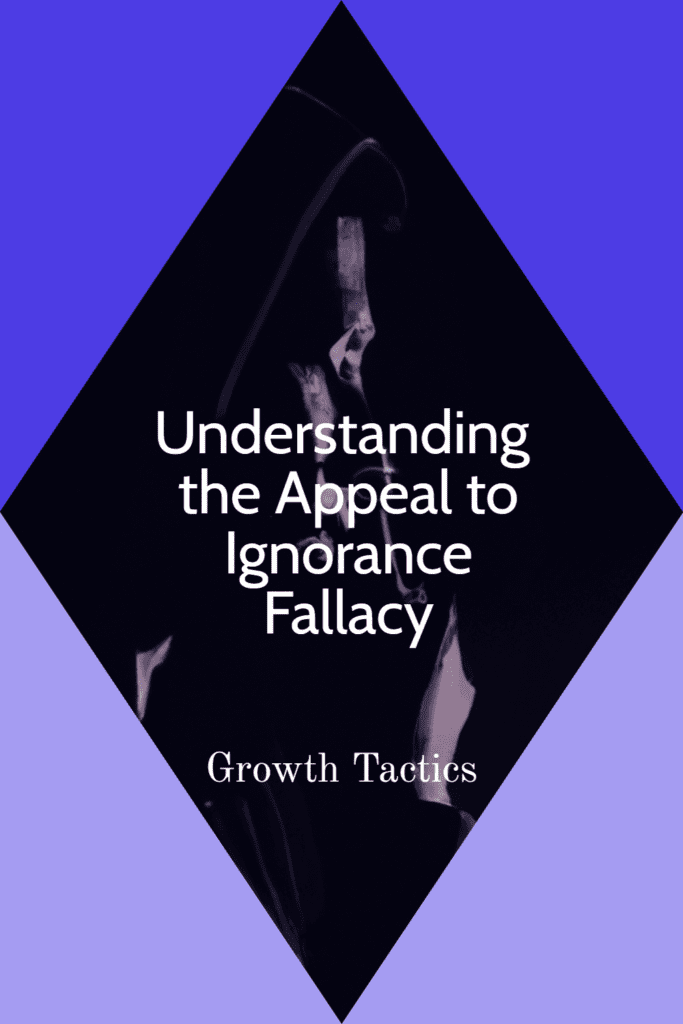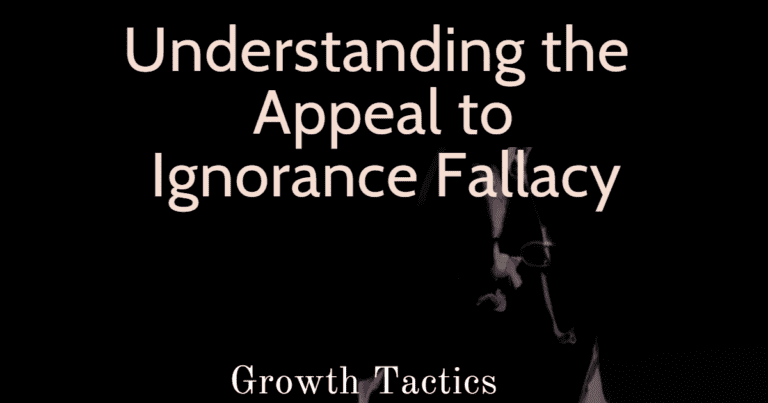Are you tired of hearing arguments that are flawed and misleading? Do you want to learn how to spot logical fallacies and improve your critical thinking skills? Look no further than this article on the appeal to ignorance fallacy!
Jump To Section
What is a Fallacy?
First things first, let’s define a fallacy. In logic and reasoning, a fallacy is an argument that appears to be valid but is flawed or misleading. Fallacies can be intentional or unintentional, and they often rely on emotional appeals or faulty reasoning.
What is the Appeal to Ignorance Fallacy?
One common fallacy is the appeal to ignorance. This fallacy occurs when someone argues that a proposition must be true because there is no evidence to the contrary, or that it must be false because there is no evidence to support it. Essentially, it’s an argument from a lack of evidence.
Examples of the Appeal to Ignorance Fallacy
One common example of the appeal to ignorance fallacy is when someone argues that ghosts must be real because no one has ever proven that they don’t exist. This is a classic case of making an argument based on the absence of evidence. Just because we don’t have evidence to say that ghosts don’t exist, doesn’t mean that they must be real. There is still no substantial evidence to support their existence.
Another example of the appeal to ignorance fallacy is when someone argues that because we haven’t found evidence that aliens don’t exist, they must be out there somewhere. While it’s certainly possible that aliens could exist, the absence of evidence doesn’t prove anything one way or the other.
Similarly, some people argue that we can’t prove that Bigfoot isn’t real, so he must exist. Again, just because we don’t have proof that Bigfoot isn’t out there, doesn’t mean that he necessarily is.
Finally, some claim that vaccines must be linked to autism because there’s no solid evidence proving otherwise. However, numerous scientific studies have shown that there is no link between vaccines and autism, and the absence of proof doesn’t change that fact.
As you can see, the appeal to ignorance fallacy can take many different forms. While it’s always good to keep an open mind, it’s important to demand substantial evidence before coming to any conclusions. Don’t fall for misleading arguments based on the absence of evidence alone!
How to Avoid the Appeal to Ignorance Fallacy
Now that you know what the appeal to ignorance fallacy is, how can you avoid falling prey to it? Here are a few tips:
- Know the burden of proof. The burden of proof is the obligation to provide evidence to support a claim. The person making a claim has the burden of proof, not the person questioning it.
- Don’t assume that the absence of evidence is evidence of absence. Just because there is no evidence to support or contradict a claim, doesn’t mean the claim is true or false. More evidence is needed to conclude.
- Look for multiple sources of evidence. Relying on one piece of evidence (or lack thereof) is often not enough to make a strong argument. Look for other sources of evidence to support or contradict a claim.
- Understand that some things are unknowable. Some questions simply don’t have answers or are beyond our current understanding. It’s okay to acknowledge this and avoid making unsupported claims.
- Be patient with ambiguity. Sometimes, the most honest answer is “I don’t know.” Learning to accept ambiguity is a key part of critical thinking and rational decision-making.
Handling the Appeal to Ignorance Fallacy: A Friendly Chat
When you come across someone who pushes the appeal to ignorance fallacy, it can be frustrating and challenging to engage in a productive conversation. But fear not! I’m here to offer some friendly advice on how to navigate these situations and encourage critical thinking without causing unnecessary conflict.
1. Stay Calm and Collected
The first thing to remember is to keep your cool. It’s easy to get caught up in the heat of the moment, but reacting with aggression or annoyance won’t help the situation. Instead, maintain a calm and collected demeanor, and approach the conversation with a genuine desire to understand the other person’s perspective.
2. Ask for Clarification
When someone presents an appeal to ignorance fallacy, start by asking them to provide more information or clarify their reasoning. Ask open-ended questions like, “Can you explain why you believe that?”, or “What evidence do you think supports your claim?”. This approach encourages them to think more deeply about their argument and might even lead them to reconsider their position.
3. Offer Alternative Perspectives
Once the person has shared their viewpoint, it’s essential to respond respectfully and present alternative perspectives or counterarguments. Use relatable examples or real-life stories that illustrate a different point of view. Engaging in a friendly discussion like this allows both parties to consider multiple perspectives and weigh the evidence more critically.
4. Share Reliable Information
Sometimes, the person pushing the appeal to ignorance fallacy might simply be uninformed or lack access to reliable information. In such cases, offer to share credible sources or reputable studies that address the topic at hand. By providing well-supported evidence, you can help them make more informed decisions and avoid relying on the absence of evidence as a basis for their argument.
5. Focus on the Socratic Method
The Socratic method involves asking a series of probing questions to challenge someone’s beliefs and encourage critical thinking. By gently guiding the conversation through thought-provoking questions like, “What would convince you otherwise?”, or “Is there any evidence you would find compelling?”, you can help the person reassess their reasoning and move away from the appeal to ignorance fallacy.
6. Know When to Step Away
Unfortunately, not everyone is open to changing their minds or engaging in a productive discussion. If you find that the conversation is becoming heated or unproductive, it may be best to step away and prioritize your mental well-being. Remember, you can still promote critical thinking and logical reasoning in other conversations and with other individuals who are more receptive to healthy discourse.
Remember, when addressing the appeal to ignorance fallacy, your goal is to create an environment for open-minded discussion and encourage the use of evidence-based reasoning. With a calm and supportive attitude, you can foster a sense of camaraderie and help others develop their critical thinking skills along the way.
When Does the Absence of Evidence Become Evidence?
You may be wondering, does the absence of evidence ever become evidence itself? It’s a thought-provoking question, and the answer is, well, it depends. Let’s dive into this topic and explore when the absence of evidence can start to hold some weight in an argument.
In some cases, the absence of evidence can become evidence when there is a reasonable expectation that evidence would exist if a certain claim were true. For example, let’s say someone claims to have a unicorn in their backyard. If we search their backyard and find no trace of a unicorn, that absence of evidence becomes evidence against their claim. We can reasonably expect there to be some evidence, such as tracks or visual sightings if a unicorn were indeed present.
However, it’s important to note that the absence of evidence is not always conclusive evidence against a claim. In many situations, the absence of evidence simply means that more investigation is needed or that the evidence is yet to be discovered. It’s crucial to approach the absence of evidence with caution and not jump to hasty conclusions.
Additional research, experimentation, or gathering of more evidence may be necessary to come to a more definitive conclusion. So, while the absence of evidence can sometimes be a piece of the puzzle, it’s not always the final word.
Counterarguments and Nuanced Cases
While the appeal to ignorance fallacy is generally problematic, there are some nuanced situations where absence of evidence can be more meaningful. Let’s explore some counterarguments and cases where this fallacy might not strictly apply:
1. Scientific Hypothesis Testing
In scientific research, the absence of evidence can sometimes be informative. When a well-designed experiment fails to find evidence supporting a hypothesis, it can contribute to evidence against that hypothesis. However, this is not conclusive and usually requires multiple studies and replications.
2. Legal Presumptions
In some legal systems, the presumption of innocence operates on a principle similar to the appeal to ignorance. A defendant is presumed innocent until proven guilty, which means that the absence of evidence of guilt is treated as evidence of innocence, at least in a legal context.
3. Proving a Negative
In some cases, it’s logically impossible to prove a negative. For instance, proving that something doesn’t exist anywhere in the universe is practically impossible. In such cases, the absence of evidence might be the best available information.
4. Well-Established Theories
When a theory has been extensively tested and no contradictory evidence has been found despite numerous opportunities, the absence of such evidence can strengthen confidence in the theory. This is different from assuming the theory is true simply because it hasn’t been disproven.
5. Reasonable Expectations of Evidence
As mentioned in the previous section, there are cases where we would reasonably expect evidence if a claim were true. In such situations, the absence of expected evidence can be meaningful.
It’s important to note that these cases are exceptions rather than the rule. They require careful consideration and should not be used to justify fallacious reasoning in general. Critical thinking and proper evaluation of available evidence remain crucial in all situations.
In Conclusion
In short, the appeal to ignorance fallacy is a common but flawed argument that relies on a lack of evidence. By understanding what the fallacy is and how to recognize it, you can improve your critical thinking skills and avoid being persuaded by faulty reasoning.
Remember:
- The burden of proof is on the person making the claim.
- The absence of evidence is not evidence itself.
- Look for multiple sources of evidence.
- Some things are simply unknowable.
- Patience with ambiguity is okay.


